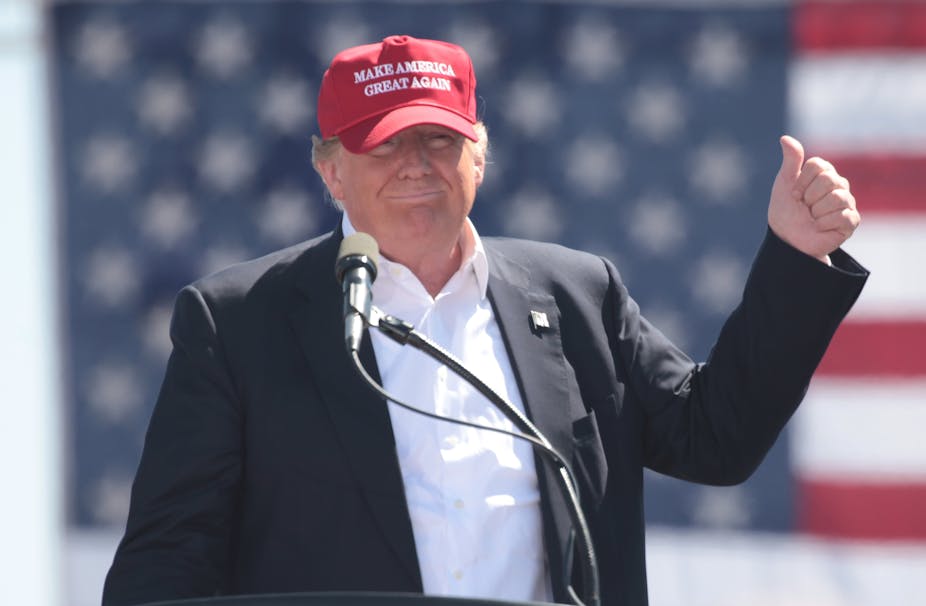This article was co-authored with and based on the debate arguments of Carol-Margaret Bitner. It is the fourth in the debate series “The impact reflected by Trump is here to stay” and argues for the motion. The third article in this series, “Morning-after reflections on the ephemerality of Trump”, expounds the role of biases, emotions and social norms in arguing against the motion.
“Every [society] in a state of equilibrium tends to remain in that state unless an external force is applied to it.” (adapted from I. Newton)
Today, we are in a world where it is becoming increasingly difficult to talk with one another. This did not start with the Trump administration, nor with the rise of social media usage. This is a direction that we seem to have been heading in for a very long time. As French philosopher and sociologist Edgar Morin reminds us in a 2004 UNESCO interview:
“Dialogue is only possible between individuals who recognise one another as subjects with the same dignity and the same rights.”
We can only see another individual as deserving of the same dignity and the same rights as ourselves if we see the other person as autonomous. We must get reacquainted with the rights granted with membership of a society, and how a government and society uphold these. Civic education provides a vibrant answer to at least part of the problem.
Civic education in middle and high school was once a required part of all public school curriculum. Why? Because civic education is about fostering and maintaining a democracy. The fact that we no longer require civic education or that we have reduced it to a multiple-choice test indicates that we have overlooked the reality that developing responsible, engaged and active citizens takes time and education.
Resentment of the professional class
Furthermore, over the past 50 years, the perception that all high school graduates should be encouraged to pursue a university degree has created an attitude that devalues vocational education. In many public schools, classes such as carpentry, metalwork, electrical circuitry and what used to be called “home economics” have completely vanished. The perception of vocational education as innately inferior to academic education translates to an attitude that devalues the vocational worker with respect to those holding a Bachelor’s degree. We have ended up with large portions of the population feeling undervalued, disrespected and misunderstood, with deep resentment in turn for the professional class. Trump has branded himself as someone who will speak to that experience, making those who have previously felt ignored, undervalued or overlooked by the “establishment” finally feel acknowledged and valued.
In addition, identity politics means we treat a point of view as a fixed position. Instead of discussing ideas, we place ourselves into “us” vs. “them” camps, where the other is vilified and challenges to our ideas are deemed as illegitimate. Yet if we don’t talk to one another, nor learn how to discuss difficult issues in a respectful, nonviolent manner, then the polarisation and divisiveness that Trump reflects is indeed here to stay.

While education is crucial for meaningful dialogue, it is insufficient without the availability to see through dialogue in a manner that allows participants in the conversation to share, analyse and engage with their knowledge and opinions and those of others. Debate is a tool for practising “perspective taking” – taking another’s point of view and examining one’s own views. Debate is learning to structure one’s ideas through a process. Diane Ravitch, in her bestseller, The Death and Life of the Great American School System, documents the decline of debates in American schools. Sadly, this is reflected in our politics and how we treat each other. We do not have the time within the jam-packed scheduled lives to foster engaged citizens, nor the courage to “risk” debate at school or elsewhere in public discourse. And in turn, by spurning the craft of persuasion, we transform outrage and vilification into virtues.
In the bubble
More and more, we live in our own little bubbles. Advances in communication technology, such as social media, have surprisingly served to polarise us further; with algorithms that show us only information we like or find controversial. This means that while countries integrate more and more diversity, their citizens have the potential to become more insular, self-centred and nationalistic. The Cambridge Analytica scandal paints a picture of the Trump presidency as a result of this trend, and by his constant attacks on his “others”, President Trump normalises and feeds back into the polarised societal discourse from which he was able to rise to power. Until a balance of tolerance through dialogue occurs, the impact reflected by Trump will be, as we are seeing now, a breakdown in “talking” and an increase in bullying, censoring and division among us.
Many of us are living in a country other than our birthplace. Do we try to understand the culture that we live in, try to understand its norms and nuances? Or do we stand outside it, looking in? How has it affected our view of “the Other?” When we are part of a culture, and genuinely concerned by it, then are we able to see the differences (our different beliefs, customs, religions… etc.) as a starting point in the search for common ground.
The legacy of leaders like Trump will be that we let the differences that have created such leaders define us. If we choose this path, which we seem to be heading down already, we provide more feedback to the cycle and we ensure that their impact is here to stay.
“Real dialogue is when you recognise the same dignity in the other… dialogue assumes equality.” (E. Morin)
The next article in this series, “Symptoms of the present: Ethno-nationalism and systemic crisis”, will argue against the motion “The impact reflected by Trump is here to stay”.

